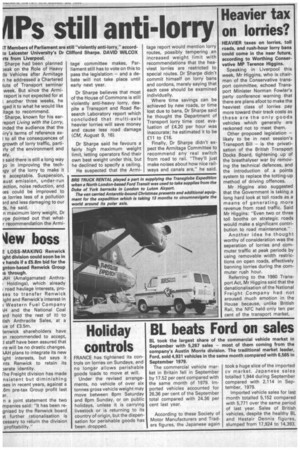es still anti-lor
Page 7

If you've noticed an error in this article please click here to report it so we can fix it.
ri Members of Parliament are still "violently anti-lorry," accordto Leicester University's Or Clifford Sharpe. DAVID WILCOX rts from Liverpool.
Sharpe had been planned peak on the Role of Heavy ds Vehicles after Armitage n he addressed a Chartered tute of Transport seminar week. But since the Armireport is not expected for at : another three weeks, he iged it to what he would like itage to recommend.
Sharpe, known for his earreport Living with the Lorry, inded the audience that the iiry's terms of reference exIto all the consequences of growth of lorry traffic, partirly of the environment and ety.
said there is still a long way 3o in improving the tech)gy of the lorry to make it .e acceptable. Suspension,
aust emission, under-run .ection, noise reduction, and (es could be improved to (e lorries less of a pollution ard and less damaging to our is, he said.
n maximum lorry weight, Dr 'roe 'Jointed out that whatrecommendation the Armi tage committee makes, Parliament still has to vote on this to pass the legislation — and a debate will not take place until early next year.
Dr Sharpe believes that most of the House of Commons is still violently anti-heavy lorry, despite a Transport and Road Research Laboratory report which concluded that multi-axle heavier lorries will save money and cause less road damage (CM, August 9, 16).
Dr Sharpe said he favours a fairly high maximum weight limit, letting operators find their own best weight under this, but he declined to specify a ceiling.
He suspected that the Armi tage report would mention lorry routes, possibly tempering an increased weight limit with recommendations that the heaviest lorries are restricted to special routes. Dr Sharpe didn't commit himself on lorry bans and cordons, merely saying that each case should be examined individually.
Where time savings can be achieved by new roads, or time lost due to bans, Dr Sharpe said he thought the Department of Transport lorry time cost evaluation of £4.20 per hour was inaccurate; he estimated it to be £11 to £16, Finally, Dr Sharpe didn't expect the Armitage Committee to recommend any real switch from road to rail. "They'll just make noises about how nice railways and canals are," he said.
























































































































































